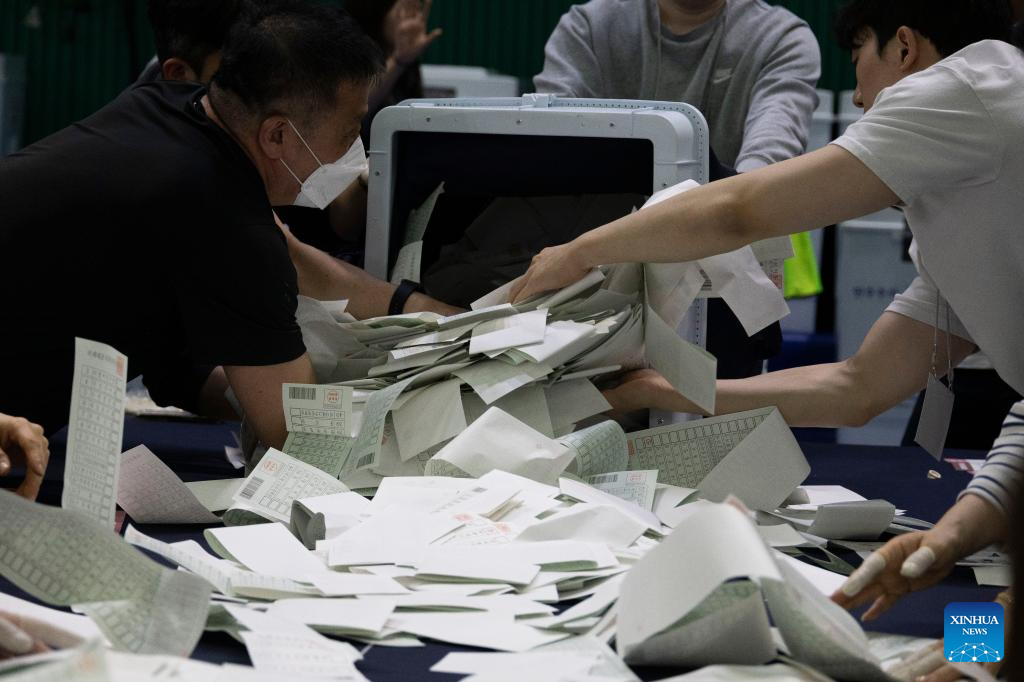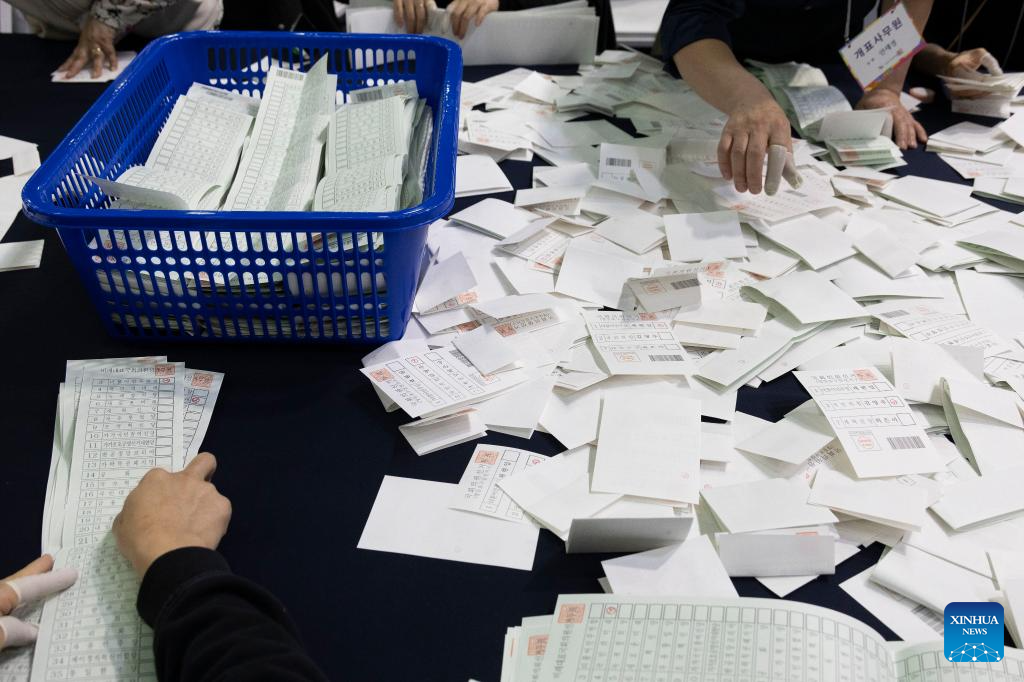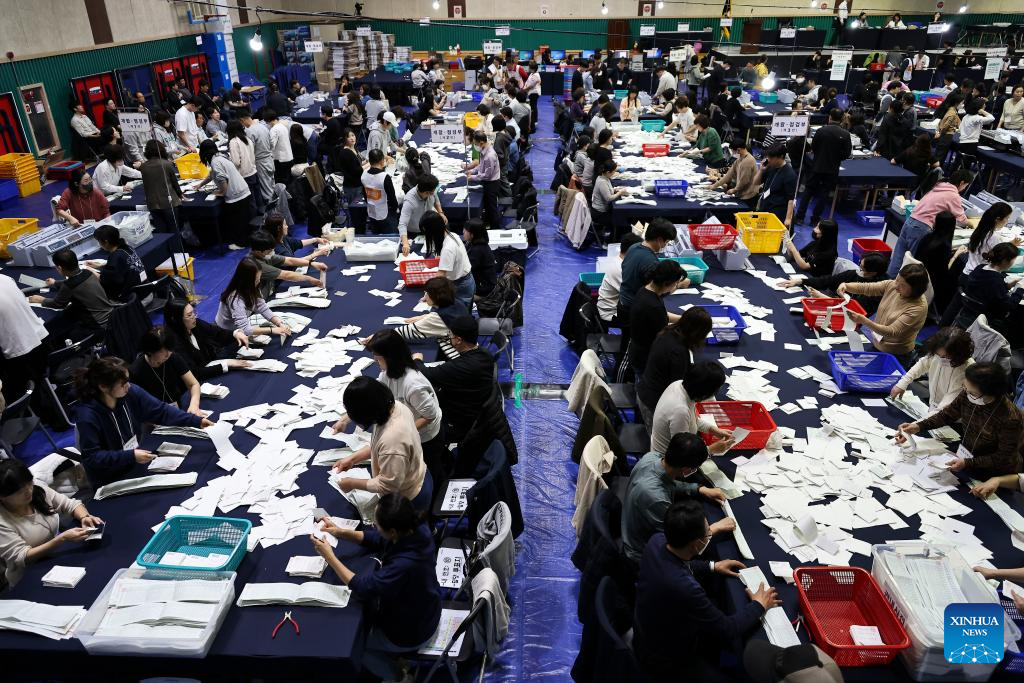S. Korea's opposition party overwhelmingly leads exit polls in parliamentary elections

Lee Jae-myung (C front), leader of South Korea's main opposition Democratic Party, celebrates the leading in exit polls in the parliamentary elections with other leaders of the party in Seoul, South Korea, April 10, 2024. South Korea's main liberal opposition Democratic Party overwhelmingly led exit polls in parliamentary elections, a survey from three local broadcasters showed Wednesday. (Xinhua/Yao Qilin)
SEOUL, April 10 (Xinhua) -- South Korea's main liberal opposition Democratic Party overwhelmingly led exit polls in parliamentary elections, a survey from three local broadcasters showed Wednesday.
The Democratic Party and its satellite party were projected to secure 178-197 seats, including the directly contested constituency seats and the proportional representation (PR) slots, the joint exit polls from KBS, MBC and SBS showed.
The ruling conservative People Power Party and its satellite party were estimated to win 85-110 parliamentary seats.
The minor liberal Rebuilding Korea Party was forecast to snatch 12-14 seats, and the minor center-right New Reform Party was predicted to take one to four seats.
The minor center-left New Future Party was estimated to win a maximum of two parliamentary seats.
The quadrennial polls for 300 members of the National Assembly were carried out at 14,259 voting stations across the Asian country to let voters cast ballots for 254 constituency seats and 46 PR slots.
The exit polls were conducted for 12 hours through 6:00 p.m. local time (0900 GMT) at about 2,000 polling stations with around 500,000 voters, in addition to some 50,000 early voters surveyed over the phone.
The tentative final voter turnout was 67.0 percent, or 29,662,313 voters among the electorate of 44,280,011 people.
It was higher than the previous election's 66.2 percent in 2020 and marked the highest in 32 years since the turnout posted 71.9 percent in 1992.
The turnout of early voting, held last Friday and Saturday, reached the highest 31.28 percent since early voting was first adopted in the 2014 local elections for the nationwide election. It was higher than 26.69 percent in 2020.
The turnout of overseas voting, which continued for six days through April 1 among domestic voters staying abroad, logged a new high of 62.8 percent. The overseas voting was introduced in 2012.

Han Dong-hoon (C front), leader of the ruling People Power Party, watches results of exit polls in the parliamentary elections in Seoul, South Korea, April 10, 2024. South Korea's main liberal opposition Democratic Party overwhelmingly led exit polls in parliamentary elections, a survey from three local broadcasters showed Wednesday. (NEWSIS via Xinhua)

Lee Jae-myung (C front), leader of South Korea's main opposition Democratic Party, celebrates the leading in exit polls in the parliamentary elections with other leaders of the party in Seoul, South Korea, April 10, 2024. South Korea's main liberal opposition Democratic Party overwhelmingly led exit polls in parliamentary elections, a survey from three local broadcasters showed Wednesday. (Xinhua/Yao Qilin)

Staff members count ballots at a ballot counting station in Seoul, South Korea, April 10, 2024. South Koreans on Wednesday went to the polls for parliamentary elections to vote for 300 members of the National Assembly. (Photo by Jun Hyosang/Xinhua)

Staff members count ballots at a ballot counting station in Seoul, South Korea, April 10, 2024. South Koreans on Wednesday went to the polls for parliamentary elections to vote for 300 members of the National Assembly. (Photo by Jun Hyosang/Xinhua)

Staff members count ballots at a ballot counting station in Seoul, South Korea, April 10, 2024. South Koreans on Wednesday went to the polls for parliamentary elections to vote for 300 members of the National Assembly. (Photo by Jun Hyosang/Xinhua)

Staff members count ballots at a ballot counting station in Seoul, South Korea, April 10, 2024. South Koreans on Wednesday went to the polls for parliamentary elections to vote for 300 members of the National Assembly. (Photo by Jun Hyosang/Xinhua)

Staff members count ballots at a ballot counting station in Seoul, South Korea, April 10, 2024. South Koreans on Wednesday went to the polls for parliamentary elections to vote for 300 members of the National Assembly. (Photo by Jun Hyosang/Xinhua)

Staff members count ballots at a ballot counting station in Seoul, South Korea, April 10, 2024. South Koreans on Wednesday went to the polls for parliamentary elections to vote for 300 members of the National Assembly. (Photo by Jun Hyosang/Xinhua)

Staff members count ballots at a ballot counting station in Seoul, South Korea, April 10, 2024. South Koreans on Wednesday went to the polls for parliamentary elections to vote for 300 members of the National Assembly. (Photo by Jun Hyosang/Xinhua)

Staff members count ballots at a ballot counting station in Seoul, South Korea, April 10, 2024. South Koreans on Wednesday went to the polls for parliamentary elections to vote for 300 members of the National Assembly. (Photo by Jun Hyosang/Xinhua)

Staff members count ballots at a ballot counting station in Seoul, South Korea, April 10, 2024. South Koreans on Wednesday went to the polls for parliamentary elections to vote for 300 members of the National Assembly. (Photo by Jun Hyosang/Xinhua)
Photos
Related Stories
- S.Korean business group visits China to seek closer ties
- SK should go forward, not backward, to expand Chinese market despite US wedge
- S.Koreans lined up to bid farewell to giant panda Fu Bao, who will return to China in early April
- Beloved giant panda Fu Bao makes last public appearance in S Korea
- S. Korea, U.S. kick off joint military exercise increasing regional tension
Copyright © 2024 People's Daily Online. All Rights Reserved.









